Tag Archives: Inspiring Head Teacher
Posted on July 15, 2016 by Sophie Hicks
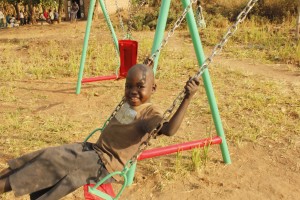
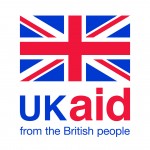
Much of a child’s early years are spent playing, exploring and testing their environment and own personal boundaries. All of this play has significant and proven benefits for a child’s early development. Research has shown that children who regularly engage in play-based learning have better cognitive flexibility, working memory and self-regulation ability.
Here at African Revival, we recognise the immense benefits of play-based learning and have incorporated it as one of the major elements of our jumpstart! nursery education programme. In our 10 jumpstart! schools, we are building playgrounds, training teachers in how to guide play-based learning and make their own play materials using natural materials, and even teaching parents how to encourage productive play at home. We know that play is incredibly important for early childhood development – but what exactly are the top benefits?
- Better behaviour
Children behave better in the classroom when they have had the chance to blow off steam and release energy on the playground during the day. Playing is a known method of stress release that can help with a child’s emotional welfare, as nursery teacher Gino, from Purongo Hill Primary School in Nwoya district says: “the playground is where the children release their stress and refresh their minds between learning”
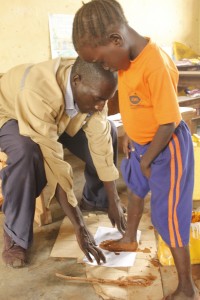
- Good social skills
Play can help young children become more aware of other people’s feelings and develop empathy. During play, whether it is inside or outside of the environment, children must interact and cooperate with each other, as well as share play equipment which requires good communication skills. Children can build relationships, learn to resolve conflicts, negotiate and regulate their emotions and behaviors. According to nursery teacher Gino, increased play-based learning at Purongo Hill has “eliminated that spirit of being selfish, and also helping the children with sharing because of that thing of collaboration”
- Improves academic performance
In 2009, research from the American Journal of School Health found that the more physical activity tests children can pass, the more likely they are to do well on academic tests. According to psychologist Kathryn Hirsch Pasek, “Children learn to count when they’re doing hopscotch […] They are telling stories on the playground, and they’re getting active.”
Furthermore, play can nurture qualities like self-discipline and attentional control, which can be just as vital for school readiness as content knowledge. Children with longer attention spans and self-control can focus more on tasks in the classroom. This is because when children engage in make-believe play that involves role playing, there are generally rules that they must follow which involves regulating their natural self and behavior. By practicing this in a safe, fun environment, their self-control is enhanced, which can then be transferred to a classroom setting.
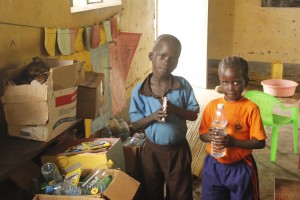
- Language development
Moreover, make-believe play that involves role playing can also help children to develop their language skills, as was shown in a British study (Lewis, 2000). Infant pupils were asked to engage in symbolic play, whereby they use objects, actions or ideas to represent other objects, actions or ideas. For example, a child may put a wooden block to her ear as a pretend mobile phone. Children who scored higher on a test of symbolic play had better language skills, both in terms of what they understood and spoke. This suggests that play helps to develop and solidify language skills.
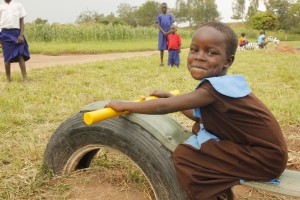
- Increases enthusiasm for learning
In northern Uganda, where drop out rates amongst primary school students are very high, play-based learning can encourage pupils to stay in school and attend more frequently. Indeed, at Purongo Hill Primary School in Nwoya district, nursery teacher Gino says that enrolment has skyrocketed since African Revival constructed a playground at the school (from 30 pupils in the nursery section to 120): “the playground has been an advantage to us because it has drawn in children, increased enrolment and reduced drop outs”.
Posted in News |
Tagged Acholi, African Revival, Development, ECD, Headteacher, inspiration, Inspiring Head Teacher, International Development, Jumpstart!, play, Teacher training, Uganda |
Leave a comment
Posted on June 16, 2016 by Sophie Hicks
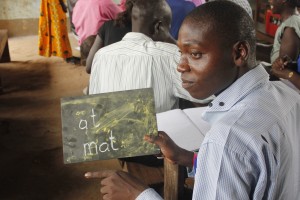 African Revival recently organised a 3- day phonics training for Koch Goma Primary School with phonics trainers Jody Spencer and Akello Catherine. Jody and Catherine used the Fun of Phonics curriculum, which has been adapted by Jody from international phonics programmes to fit the local teaching environment in Uganda. Teachers were trained in a multisensory synthetics phonics approach using actions and song, and practiced using teaching methods such as pair reading.
African Revival recently organised a 3- day phonics training for Koch Goma Primary School with phonics trainers Jody Spencer and Akello Catherine. Jody and Catherine used the Fun of Phonics curriculum, which has been adapted by Jody from international phonics programmes to fit the local teaching environment in Uganda. Teachers were trained in a multisensory synthetics phonics approach using actions and song, and practiced using teaching methods such as pair reading.
But what is phonics? How is it different from teaching children to read using the rote memorization technique? And why is it so effective? Find out all you ever wanted to know about phonics here!
What is phonics?
Phonics is a method of teaching reading and writing that focuses on sounds. In the English language there are only 26 letters in the alphabet, however there are 44 sounds and 120 main ways of writing these sounds. Phonics teaches children to recognise and write these sounds by training them to correlate these different sounds (phonemes) with letters (graphemes).
 Take an example
Take an example
Phonemes are the smallest units of sound that make up a word.
Take the word ‘star’. While it consists of only one syllable, it contains four different phonemes: /s/ /t/ /a/ /r/. When teaching phonics, children will be taught the sound each phoneme makes, then how to put these sounds together to sound out the whole word.
Some sounds have one letter, while others have two or three. For example, the word ‘fish’ has four letters but only three sounds – the letters ‘sh’ make one sound but are two letters.
Why is phonics an effective teaching method?
A written language is basically a kind of a code. Teaching phonics is just teaching children to crack that code by learning to recognize the sounds of letters and different letter combinations. Children learn the simple bits first and then easily progress to get the hang of the trickier bits. Phonics gives children the skills to decode new words that they have not been taught by sounding them out, therefore equipping them with the skills to read and write independently.
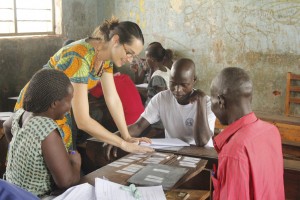 Is phonics effective?
Is phonics effective?
Yes. A study in the UK led by Educational Psychologist Marlynne Grant has shown the effectiveness of phonics instruction at nursery and primary level. The study followed a group of 30 children who were taught using phonics for the first time in nursery, and tracked their progress for three years, to the end of year two in primary school. Grant’s research found that in 2013, members of the year two class of seven-year-olds were on average 28 months ahead of their chronological age for reading and 21 months above their age for spelling.
Why is rote learning not effective?
Rote learning is a memorisation technique centred on repetition and cramming. It is based on the idea that the more a child repeats a piece of information, the quicker they will be able to recall it. However, this quick recall often comes at the expense of a deeper understanding because rote learning does not focus on comprehension.
In Uganda, pupils are often taught English using this rote learning method. Children are taught to repeat and memorize particular sentences and words, but are not taught how to decipher specific sounds in words. This means that some children can read words they have already been taught, but cannot tackle new words on their own. Other children, however, find it difficult to memorize words and can progress through primary school with a limited reading ability. Many children leave primary school without being able to read independently when taught using rote memorization.
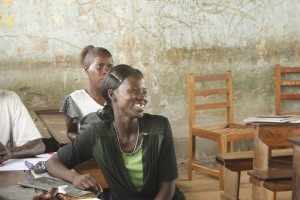 What are literacy levels in Uganda?
What are literacy levels in Uganda?
Across Uganda, one third of youth are illiterate and pass rates for English amongst children aged 10-16 are only 47% (Uwezo). In many schools, especially those in poorer rural areas, quality of education remains poor and teachers lack practical skills and educational resources. Many children leave school without the ability to read simple sentences that they have not already been taught.
Why does literacy matter?
Children’s poor skills in reading and writing have a direct result on their results in other academic subjects such as mathematics and science because the main academic language for exams in primary school is English. Children who cannot read and understand questions for these subjects often perform poorly in exams and do not develop literacy skills vital for success in the workplace and beyond.
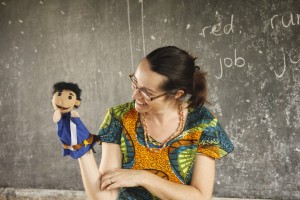 How can training teachers in phonics help improve literacy levels?
How can training teachers in phonics help improve literacy levels?
The root cause of illiteracy is the way teachers are trained in Uganda. In general, they are taught to use rote memorisation to train pupils to read and write, often graduating from Primary Teaching College without being confident in teaching English. In some rural schools, some teachers struggle with the English language themselves following years of poor instruction, so struggle to teach the language in the classroom. Moreover, they lack skills in effective, research-based teaching methods which engage learners. By training teachers in phonics methodology, they will be equipped with the skills to teach children how to decode new words and give them the framework to independently develop their literacy level. Strong literacy skills will help students to improve their performance in other subject areas, with general comprehension across subjects enhanced by the ability to read and write well.
Posted in News |
Tagged African Revival, Changemaker, Development, ECD, Education, Gulu, inspiration, Inspiring Head Teacher, International Development, Jumpstart!, Nursery School, School Development, Teacher training |
Leave a comment
Posted on May 5, 2016 by Sophie Hicks
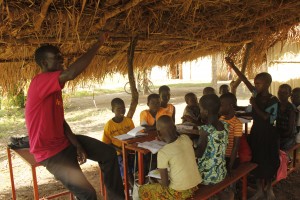 In rural Nwoya district, Northern Uganda, many children are not in school. Some have dropped out – others have never been to school at all. The reasons for dropping out are myriad. Some families do not have enough money to pay the fees for multiple children at school, as well as school uniform and scholastic materials. Other children are required to stay at home to care for sick relatives or help with household chores.
In rural Nwoya district, Northern Uganda, many children are not in school. Some have dropped out – others have never been to school at all. The reasons for dropping out are myriad. Some families do not have enough money to pay the fees for multiple children at school, as well as school uniform and scholastic materials. Other children are required to stay at home to care for sick relatives or help with household chores.
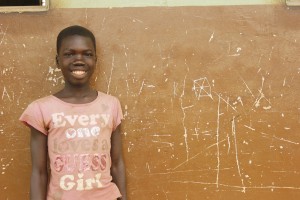 Molly (right) is one young girl who, at 13 years old, had never been to school until she enrolled in Speed School. Her uncle, who she lives with, did not allow her to go to school; instead she stayed at home to do most of the cooking and cleaning. And hers is not an isolated case. Sarah, also 13, had to drop out of school when her father spent all the money meant for school fees on the bride price for Sarah’s step mother. Paying dowry is still a tradition in northern Uganda and often impoverishes families. After the money had been used on his new bride, Sarah’s father asked her and her 4 siblings to stay at home until he found the money for their education. 3 are now enrolled in Speed School, which is a free initiative.
Molly (right) is one young girl who, at 13 years old, had never been to school until she enrolled in Speed School. Her uncle, who she lives with, did not allow her to go to school; instead she stayed at home to do most of the cooking and cleaning. And hers is not an isolated case. Sarah, also 13, had to drop out of school when her father spent all the money meant for school fees on the bride price for Sarah’s step mother. Paying dowry is still a tradition in northern Uganda and often impoverishes families. After the money had been used on his new bride, Sarah’s father asked her and her 4 siblings to stay at home until he found the money for their education. 3 are now enrolled in Speed School, which is a free initiative.
The reasons why children have dropped out of school are complex and difficult to address. But now a new initiative called Speed School, implemented by African Revival in partnership with Geneva Global, is aiming to get these drop outs back into school. The Speed School programme was previously implemented by Geneva Global in Ethiopia. The project was such a success that it was brought to Uganda and adapted to the national education system. African Revival is now managing 30 Speed School classes, each with 25 pupils. Over one year, we aim to educate and reintroduce 750 pupils into mainstream education and address the root causes of primary school drop outs and absenteeism.
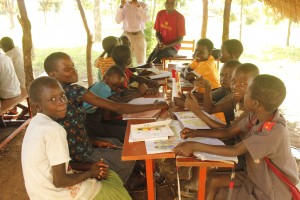 Speed School is an accelerated learning programme which will teach children the first 3 years of the primary curriculum, after which they will re-join the formal education system in Grade 4. Children are taught using effective participatory and child-centred learning methods which the Speed School teachers (called facilitators) learned during an intensive training session at the start of the project. The facilitators are also taught different ways to lesson plan, make learning aids, and encouraged to place an emphasis on critical thinking skills in class. Reduced class sizes of 25 pupils (the average teacher-pupil ratio in government schools is 1:80) also makes classes easier to manage and improves behaviour and pupil motivation. Moreover, the facilitators are from the local community, so as well as teaching the condensed curriculum, they can also monitor their pupils to ensure that they stay in Speed School and do not drop out again.
Speed School is an accelerated learning programme which will teach children the first 3 years of the primary curriculum, after which they will re-join the formal education system in Grade 4. Children are taught using effective participatory and child-centred learning methods which the Speed School teachers (called facilitators) learned during an intensive training session at the start of the project. The facilitators are also taught different ways to lesson plan, make learning aids, and encouraged to place an emphasis on critical thinking skills in class. Reduced class sizes of 25 pupils (the average teacher-pupil ratio in government schools is 1:80) also makes classes easier to manage and improves behaviour and pupil motivation. Moreover, the facilitators are from the local community, so as well as teaching the condensed curriculum, they can also monitor their pupils to ensure that they stay in Speed School and do not drop out again.
As well as Speed School classes, Geneva Global have also established self-help groups for the parents of the enrolled pupils. In these groups parents – primarily mothers – will be trained in Income Generating Activities to economically empower them so they are able to meet the financial demands of educating their children. These activities may include Village Savings and Loans Associations (VSLA), agriculture or business activities.
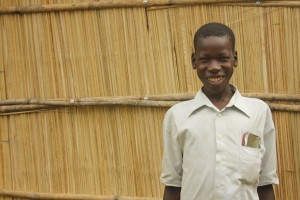 By ensuring the parents are empowered economically, the Speed School programme aims to address one of the main reasons why children dropped out of school in the first place: lack of money for school fees. Even if parents want their children to gain an education, school is not always a priority. Richard, a bright-eyed 13 year-old, dropped out of school in 2012 because both of his parents had died. He now lives with his grandmother, and has a hand-to-mouth existence: his grandmother is frail and can only generate enough money to feed Richard. No money is left for school fees. But now Speed School is helping Richard to study again and get an education, so one day he can achieve his dream of becoming a pilot: “I want to be a pilot so I can move in different places, and learning ways of living and different cultures”. Motivated and focus, we are sure Richard, along with the other children in Speed School, will excel this year in this supportive programme and go on to succeed in the future.
By ensuring the parents are empowered economically, the Speed School programme aims to address one of the main reasons why children dropped out of school in the first place: lack of money for school fees. Even if parents want their children to gain an education, school is not always a priority. Richard, a bright-eyed 13 year-old, dropped out of school in 2012 because both of his parents had died. He now lives with his grandmother, and has a hand-to-mouth existence: his grandmother is frail and can only generate enough money to feed Richard. No money is left for school fees. But now Speed School is helping Richard to study again and get an education, so one day he can achieve his dream of becoming a pilot: “I want to be a pilot so I can move in different places, and learning ways of living and different cultures”. Motivated and focus, we are sure Richard, along with the other children in Speed School, will excel this year in this supportive programme and go on to succeed in the future.
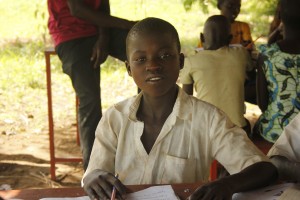
Posted in News |
Tagged Acholi, African Revival, Changemaker, Education, Gulu, Headteacher, inspiration, Inspiring Head Teacher, International Development, Lord's Resistance Army, Northern Uganda, Nursery School, School Development, Teacher training |
Leave a comment
Posted on March 21, 2016 by Elaine Miller
Fred is the Head Teacher at Juba Road Primary School in Northern Uganda
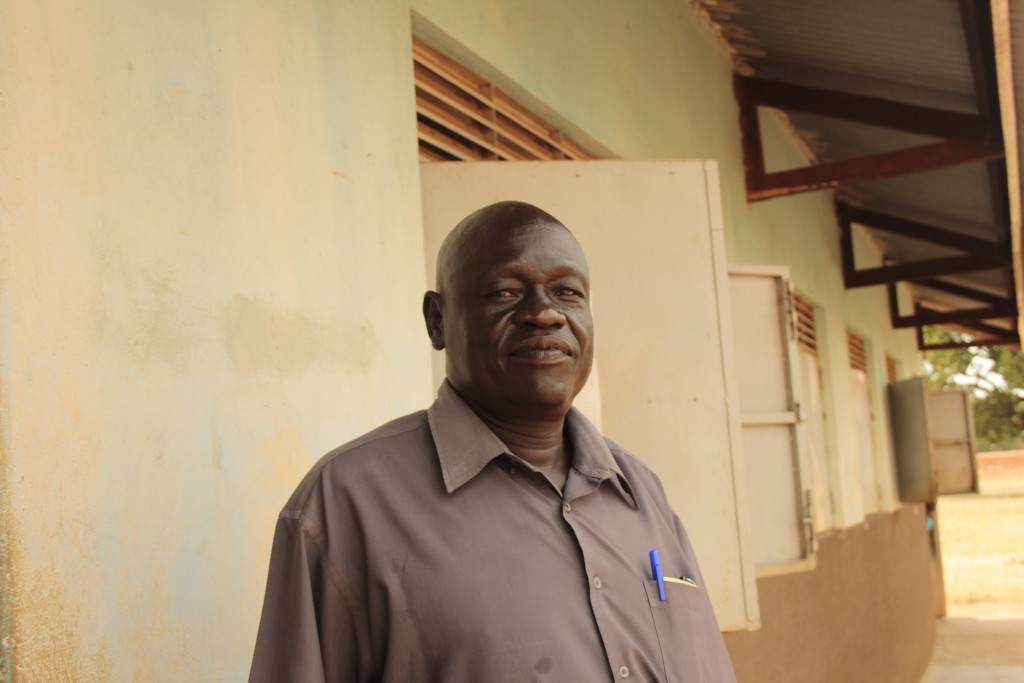 I studied in this very primary school when I was a child. My father was on the management committee. They were the very people who built this school in 1947. When I was growing up, I really admired teachers. I admired their commitment, the way they presented themselves, and the way they brought up the young children.
I studied in this very primary school when I was a child. My father was on the management committee. They were the very people who built this school in 1947. When I was growing up, I really admired teachers. I admired their commitment, the way they presented themselves, and the way they brought up the young children.
When I graduated primary school, I went to study in a seminary. I wanted to become a priest. In the seminary we used to teach children and read with them, I always loved children and wanted to see them develop. When we entered the seminary we were many, almost 100. But only 5 became priests.
The bible says, “Many are called but few are chosen”. We were called to become seminarians but not chosen to be priests. But that did not stop us. For me, the integrity of teachers in those days, their professionalism, their conduct, and the respect the community gave to teachers, motivated me to become a teacher.
Total hopelessness
During the insurgency by the Lord’s Resistance Army, everything at this school was completely destroyed, the classrooms, the teachers’ houses, even the learning materials. When I was posted back here in 2012, there was almost total hopelessness in the community. You know when there is loss and when there is war, people lose hope in life. We had to talk to the parents to rebuild hope. Then we could start rebuilding the school.
We came up with a development plan for the school. Our main goal was to improve performance by providing quality education. Quality education is the role of all the community, the parents, teachers, pupils, the local district, and the Government. So we had to involve all the stakeholders to see that we improved the school. We had to improve the economic welfare of the community, because there was almost total poverty in the community. Parents could not support their children or even provide basic material like pens or school uniform.
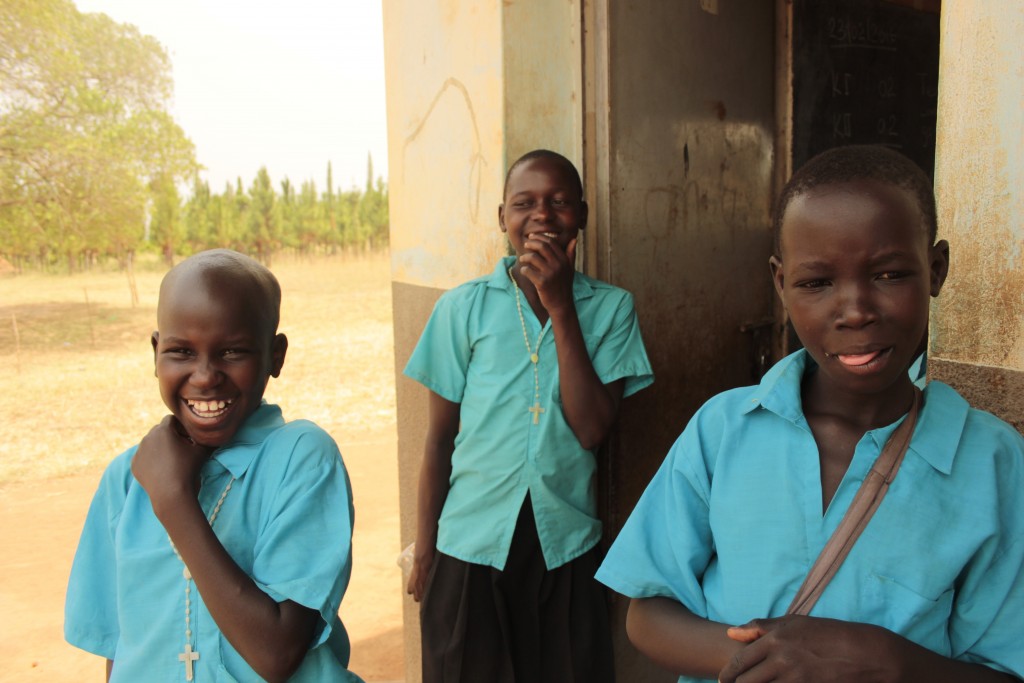
Holistic education
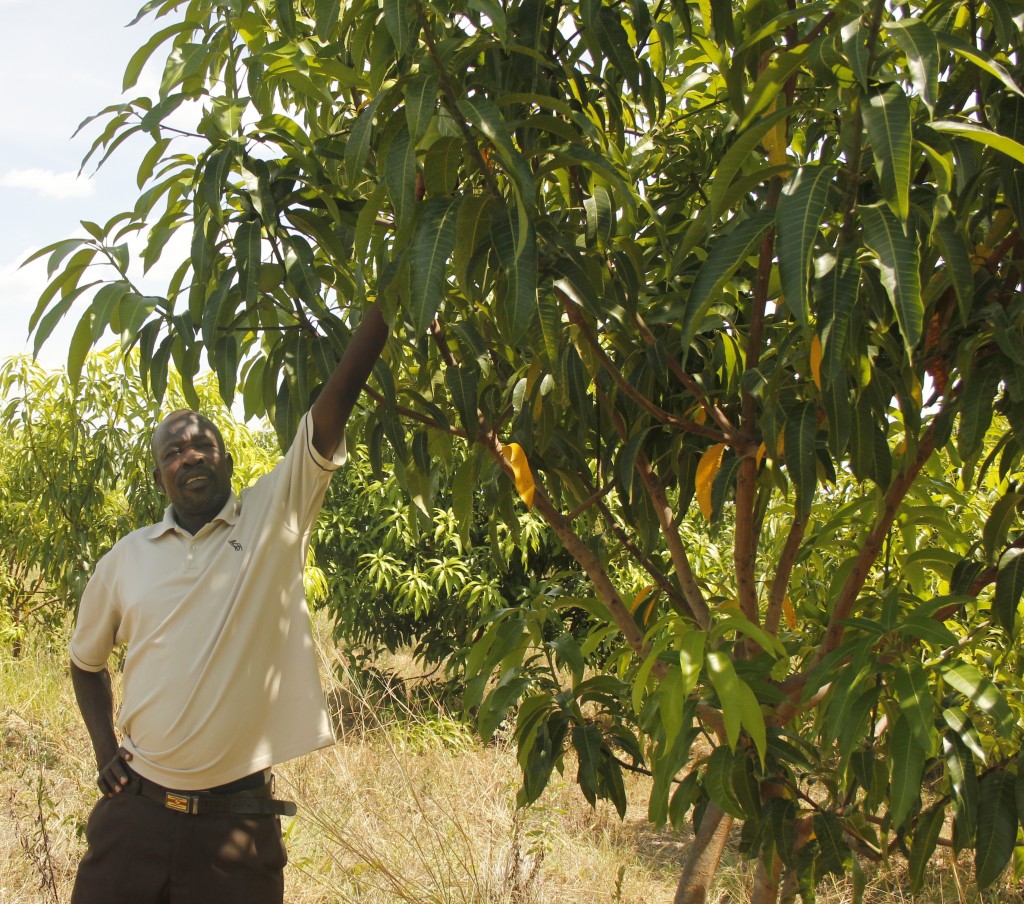 I was happy because African Revival helped us set up beekeeping and farming. Behind the wood lot is a fruit garden. It’s a big plot of fruit trees and the mangoes have started maturing already. During the rainy season we grow vegetables: maize, tomatoes, onions, and aubergines. Each class has a plot they manage and they sell the produce to raise money for their class. We call the pupils ‘Farmers of the Future’.
I was happy because African Revival helped us set up beekeeping and farming. Behind the wood lot is a fruit garden. It’s a big plot of fruit trees and the mangoes have started maturing already. During the rainy season we grow vegetables: maize, tomatoes, onions, and aubergines. Each class has a plot they manage and they sell the produce to raise money for their class. We call the pupils ‘Farmers of the Future’.
We gave each child two mango seedlings to take home. They can plant them in their village and show their parents what they’ve learnt at school. When the trees mature in a year, they can make 100,000 Shillings (£22) from the fruit. This is integrating the school with the community. We do things together as one unit – the school and the community.
We also teach beekeeping and goat keeping so when these children leave school they can be self-sustainable. Not every child can go to university. But if children finish primary school with these skills, they can improve the livelihoods of their families.
You must love your profession
I’ve taught for 25 years now. I love my profession. What can motivate you to work hard and perform well if you don’t love your profession? When you have your profession within you, you know what you’re supposed to do.
As a Head Teacher you must be self-motivated. You must love your country. You must love your nation. You must love your people. Teaching is love for humanity. If you don’t have love for humanity, you won’t succeed. These children are the most innocent people. When you care for them, you build a generation that will be self-sustaining, a generation that will be caring, a generation that will be peace-lovers. And we will be free from violence.
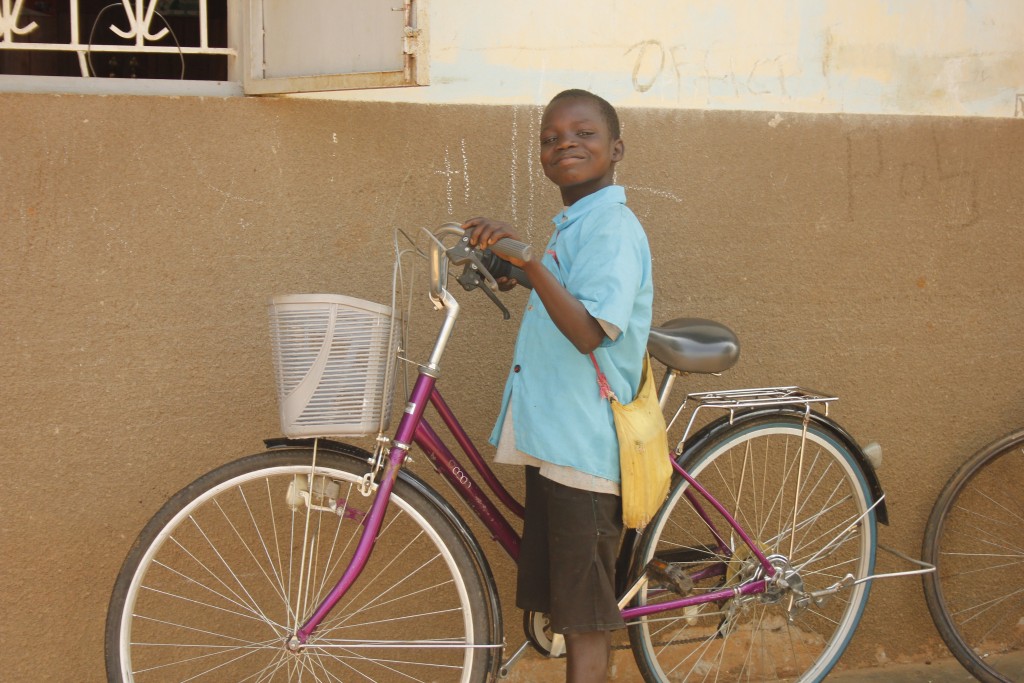
Posted in News |
Tagged Education, Head Teacher, Inspiring Head Teacher, Northern Uganda |
Leave a comment
Posted on March 8, 2016 by Elaine Miller
This International Women’s Day, we hear from inspirational Head Teacher Lily-Rose on what she is doing for Girls Education in Northern Uganda
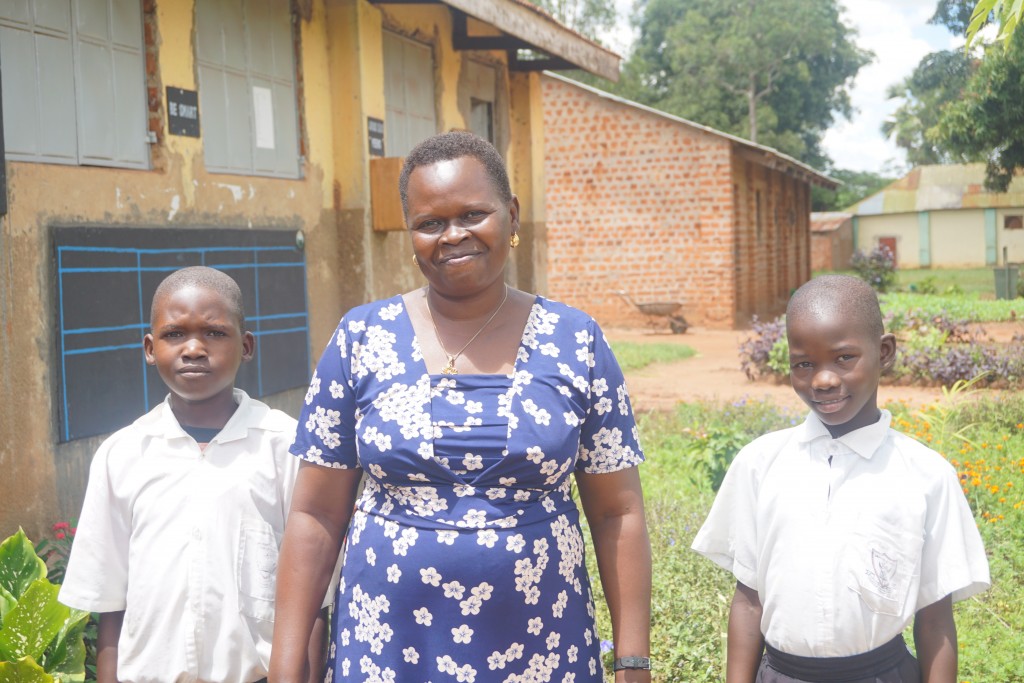
“Right from when I was in primary school, I admired teachers. They were well-respected people with good families. I had one teacher called Rosabella. She was organised and hard working, I said to myself, ‘The day I become a teacher I will be like Rosabella’.
This is my fifth year at Anaka Primary School, but I’ve been a Head Teacher for 15 years. Many people here know me and that makes me proud to be a Head Teacher. What I enjoy most about my job is having children who are disciplined, parents who love their school, and teachers who work together. This makes me very happy.
As an important lady in the community, I try to share my own experiences with our girls. I was once a young girl too with the same challenges. I have female teachers who are role models and we have monthly meetings with the girls to discuss any issues. On top of that, we have built girls’ changing and washrooms and we have trained the parents on how to make sanitary pads.
At least once a term I invite female parents to the school. Not all of them know how to take care of their girls. Some of them don’t provide basic items like soap or sanitary pads. We help the parents understand their responsibilities. We tell them to provide for their girls so they don’t get interested in the men outside school. By providing for our girls at home, we can keep them in school.
Above all, I’m a mother and a role model to these girls. I hope that because of me, many girls will continue studying and will become something in the future. I hope many successful girls will come out of my life!
My advice would be to send your children to school. When many people are educated, the country will never remain poor. And don’t forget your girls. Some parents treat their boys as if they are special or more important than girls, but I tell them to treat their boys and girls equally. All of them are special people who can succeed in anything.”
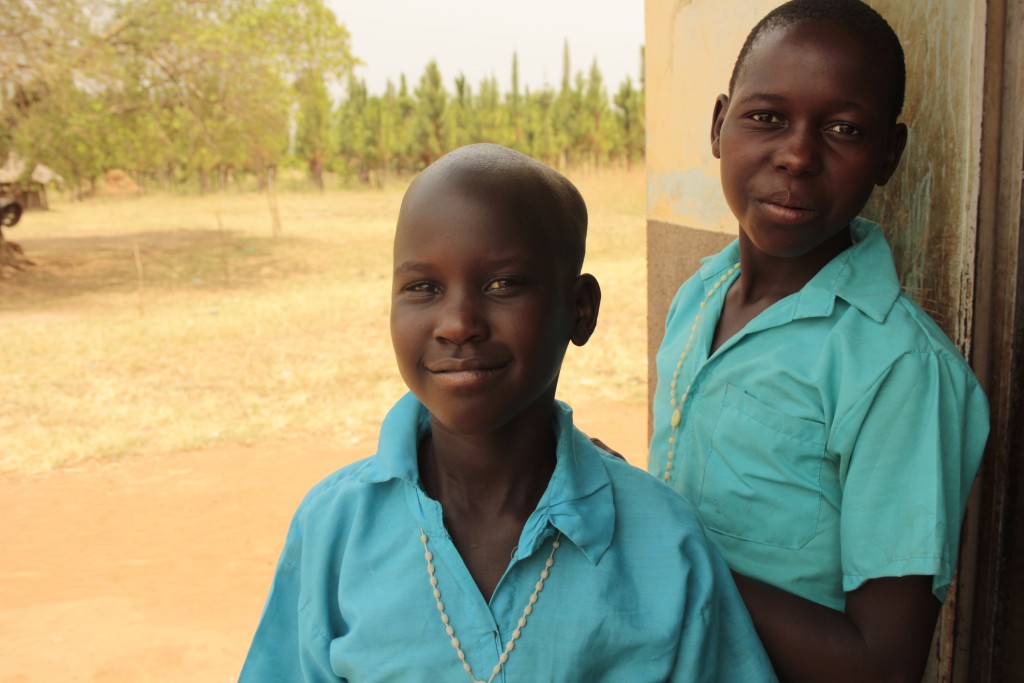
Posted in News |
Tagged Education, Girls Education, Head Teacher, Inspiring Head Teacher, International Womens Day, Northern Uganda, Uganda |
Leave a comment





















